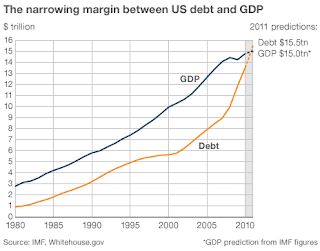US loses AAA credit rating after S&P downgrade
6 August 2011
One of the world's leading credit rating agencies, Standard & Poor's, has downgraded the United States' top-notch AAA rating for the first time ever.
S&P cut the long-term US rating by one notch to AA+ with a negative outlook, citing concerns about budget deficits.
The agency said the deficit reduction plan passed by the US Congress on Tuesday did not go far enough.
Correspondents say the downgrade could erode investors' confidence in the world's largest economy.
It is already struggling with huge debts, unemployment of 9.1% and fears of a possible double-dip recession.
The downgrade is a major embarrassment for the administration of President Barack Obama and could raise the cost of US government borrowing.
This in turn could trickle down to higher interest rates for local governments and individuals.
However, some analysts said with debt woes across much of the developed world, US debt remained an attractive option for investors.
The other two major credit rating agencies, Moody's and Fitch, said on Friday night they had no immediate plans to follow S&P in taking the US off their lists of risk-free borrowers.




'Flawed judgement'
Officials in Washington told US media that the agency's sums were deeply flawed.
Unnamed sources were quoted as saying that a treasury official had spotted a $2 trillion [£1.2 trillion] mistake in the agency's analysis.
"A judgment flawed by a $2tn error speaks for itself," a US treasury department spokesman said of the S&P analysis. He did not offer any immediate explanation.
John Chambers, chairman of S&P's sovereign ratings committee, told CNN that the US could have averted a downgrade if it had resolved its congressional stalemate earlier.
"The first thing it could have done is raise the debt ceiling in a timely matter so the debate would have been avoided to begin with," he said.
International reaction to the S&P move has been mixed.
China, the world's largest holder of US debt, had "every right now to demand the United States address its structural debt problems and ensure the safety of China's dollar assets," said a commentary in the official Xinhua news agency.
"International supervision over the issue of US dollars should be introduced and a new, stable and secured global reserve currency may also be an option to avert a catastrophe caused by any single country," the commentary said.
However, officials in Japan, South Korea and Australia have urged a calm response to the downgrade.
The S&P announcement comes after a week of turmoil on global stock markets, partly triggered by fears over the US economy's recovery and the eurozone crisis.
S&P had threatened the downgrade if the US could not agree to cut its federal debt by at least $4tn over the next decade.
Instead, the bill passed by Congress on Tuesday plans $2.1tn in savings over 10 years.
S&P said the Republicans and Democrats had only been able to agree "relatively modest savings", which fell "well short" of what had been envisaged.
The agency also noted that the legislation delegates the lion's share of savings to a bipartisan committee, which must report back to Congress in November on where the axe should fall.
The bill - which also raises the federal debt ceiling by up to $2.4tn, from $14.3tn, over a decade - was passed on Tuesday just hours before the expiry of a deadline to raise the US borrowing limit.
S&P said in its report issued late on Friday: "The downgrade reflects our opinion that the fiscal consolidation plan that Congress and the administration recently agreed to falls short of what, in our view, would be necessary to stabilise the government's medium-term debt dynamics.
"More broadly, the downgrade reflects our view that the effectiveness, stability, and predictability of American policymaking and political institutions have weakened at a time of ongoing fiscal and economic challenges."
The agency said it might lower the US long-term rating another notch to AA within the next two years if its deficit reduction measures were deemed inadequate.
S&P noted that the bill passed by Congress this week did not include new revenues - Republicans had staunchly opposed President Barack Obama's calls for tax rises to help pay off America's deficit.
The credit agency also noted that the legislation contained only minor policy changes to Medicare, an entitlement programme dear to Democrats.
"The political brinksmanship of recent months highlights what we see as America's governance and policymaking becoming less stable, less effective, and less predictable than what we previously believed," it added.



